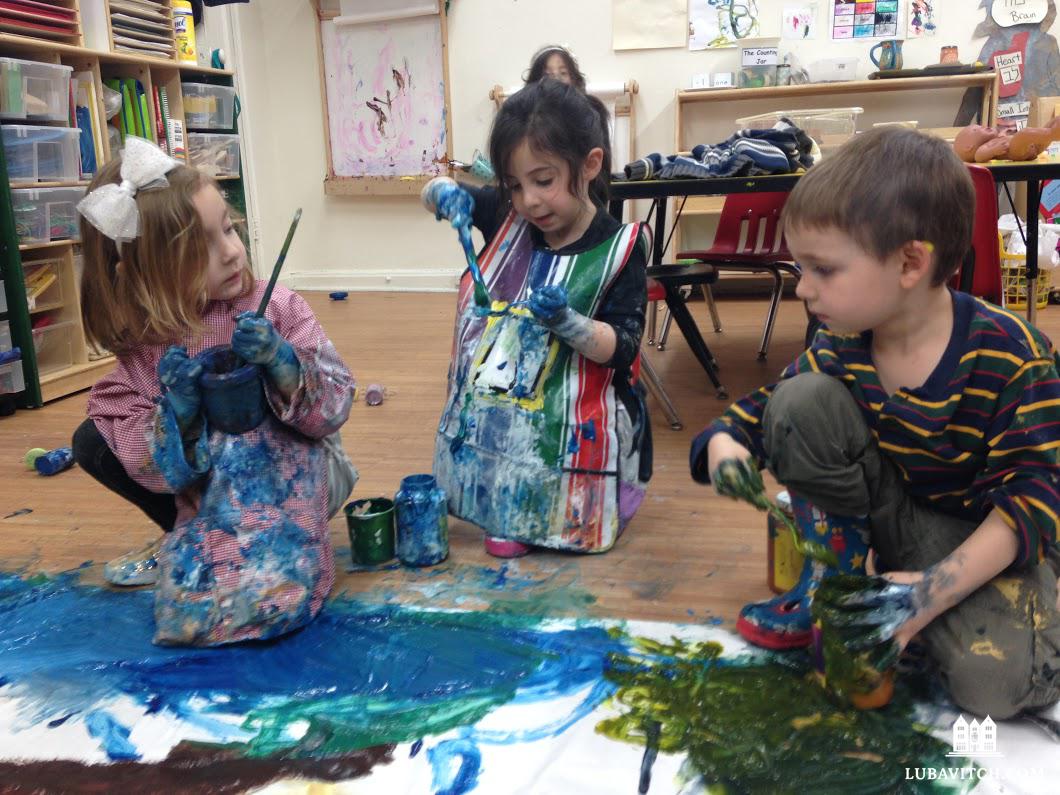Most parents drop their children off at preschool and then move on with their day.
At this northern Manhattan school, the parents follow their kids right through the front door.
This is Osher Early Learning Center, where the holistic curriculum is directed by children’s natural curiosity. The school’s parents bequeathed it the name “Osher,” meaning both happiness and wealth, reflecting the joy and enrichment Osher provides. Advanced science experiments, music classes, and engineering explorations are led by professional scientists, musicians, and architects, otherwise known as mom and dad. “It’s almost like a home school here,” says director Elisheva Kirschenbaum. “Each parent brings their own abilities, passions, and interests, they bring themselves, to school. It’s a real group effort.”

Since the school’s 2011 opening, parents have been a mainstay at Osher, from teaching classes, to leading field trips or balancing the books. In exchange, they receive work/study grants that allow the school to be self-sustaining and affordable for families wanting this caliber of a preschool experience for their children.
Anna Pervukhin is a criminal defense attorney in Manhattan. Two of her children graduated the school, and she has twins in the wings waiting for their turn to attend. Pervukhin is a passionate supporter of Osher and has dedicated her volunteer hours to marketing the school as well as redesigning its website.
“A lot of the parents have backgrounds in math and science and music and art, and every time they teach a class or do a special project, it gets absorbed into the larger curriculum,” she says. “A few years back, a parent who is an architect did a lesson on bridges that inspired the teachers to develop a whole series of building projects. I suppose hired professionals could do the same thing, but having parents involved hands-on injects a special energy, a special vibe. Parents are invested, and they pour their whole hearts into what they are doing. The kids can feel that.”
When students expressed an interest in shopping and storefronts, Kirschenbaum hauled out a big cardboard box and they had a go at it. They measured, sawed (with their teacher’s help), created signage, and chose merchandise. In the end, they had a fun store to play with and in the process they accrued mathematical, literacy, and cooperation skills. Another box became a space shuttle (a popular haunt for kids eager to blast off) in conjunction with the class’ unit on space.
Osher is a bilingual program. The lead teacher is a native Hebrew speaker and the children leave the school speaking this second language fluently. Kirschenbaum is passionate about her students learning Hebrew as a gateway for future Jewish involvement. People who speak and read Hebrew, she believes, have a “much easier time talking about Torah and G-d. They can open a siddur [prayer book] and be inspired by a blessing, without having to have the words translated.”

The small school teaches Judaism and the Hebrew alphabet through a hands-on, Reggio-inspired approach. Students made lightning and thunder to mimic the giving of the Torah, and planted trees in honor of the holiday of Tu B’Shvat. To learn about the concept of kosher, they marched off to a neighborhood store to check out kosher products and symbols.
Every morning before work, Gisele Garelik and a friend come early for breakfast club. They get a chance to witness and take part in their tots’ school experiences. “I love watching my kids bond with other children. I love watching them develop Jewish hearts and souls. I love that they have their own lives outside of our family unit.”
Her husband built cubbies for the kids and helped build the school’s stability with financial planning. Garelik, who began the school’s PTA, believes strongly in the parent-school partnership. The Garelik’s involvement, she says, shows their two children “that we care about what they are learning, who they are learning with, and how they are learning.” Her friendships with other parents and teachers, she says, “serves as a good model for their ability to develop relationships.”
With a program built so profoundly on the trifecta of parents, teachers, and children, Osher’s inspiration travels naturally beyond the classroom.
Pervukhin says that the school’s warm, integrative approach is trickling into her own home. “I feel like my kids are holding us all to a higher standard. I went from being a Yom Kippur type Jew to keeping a kosher-style kitchen and making a really big deal about Shabbat and holidays. My husband is now obsessed with studying Hebrew so he can “keep up” with the kids. Even my mother, who lives out of state, has become more religious. There is nothing like seeing Judaism through the eyes of an enthusiastic toddler to squash cynicism.”
Whether it is upholstering a chair or tasting samples at a farmer’s market, creating art from found materials or discovering the sounds of the Aleph-Bet, Kirschenbaum’s passion to educate children in a happy, child-directed manner shines through. “Learning happens organically through life,” she notes. “This is childhood as it should be.”

Be the first to write a comment.